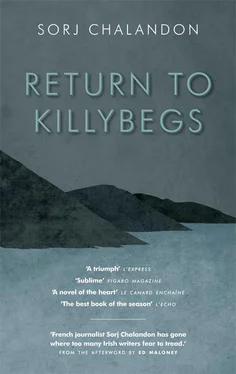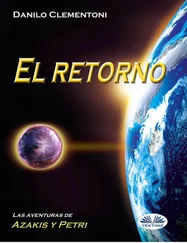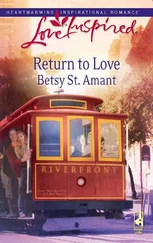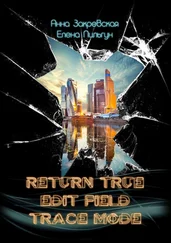— The IRA keeps saying that it wants peace? Well, on our side, too, we want peace. So let’s make it together, this peace. You and us, Tyrone.
— I’m not a traitor.
— But who said anything about being a traitor? What you’ll be doing is the opposite, it’s heroic. You lot are always saying that you have to make war to have peace, and I’m proposing you declare war on war.
— This is bullshit!
— Think what you like, smiled the British agent. You’re fucked, Meehan. So instead of me finding a reason for you, you might as well find one yourself, okay?
— You dirty bastard!
— Filthy scumbag! Fucking bollocks! Dirty Brit! Knock yourself out. Though I will tell you that it never works with a guy who thinks he’s being forced. I prefer willing men. And you are willing, aren’t you, Meehan?
— Let me go.
— I’m offering you a brand-new conscience.
I closed my eyes. Jack’s respect, Sheila’s love.
— When you go to the trouble of becoming a hero, you may as well accept the Nobel Peace Prize, don’t you think?
The agent placed a hand on my shoulder. The pressure of his fingers. A moment both brutal and soothing.
— Regret spoils life, Tyrone. We will help you to rid yourself of it.
I met his eyes.
— And, you know, by lying about Danny’s death, you had already started down this path.
I put my head in my hands.
— I’ll leave you be a moment, Tyrone. Not to reflect, but to collect yourself. If you need us, we’ll be in the corridor.
There was a habit Sheila had had forever. Even when she was still at home with her mother, when her father was interned, she used to enter contests in newspapers and department stores. She’d fill out questionnaires to win promotional discounts, a fleece-lined dressing gown or the Christmas turkey. When I was locked up, my wife took up her pencil again. She’d tick off boxes, look up answers in the dictionary, slip her name into contest boxes. For her it was a way of waiting, of killing all that time without me. When I was in the Crum, she won a sewing kit in a wicker basket, a 24-piece set of silver-plated cutlery, a football, an alarm clock, chocolates and dozens of discounts. When I got out of the Kesh, there was a new armchair in the living room, first prize from Stewarts. One day, she won her weight in wool after answering five questions about knitting.
Sheila didn’t complain about her lot. She loved me because I was fighting and had prepared her son to fight. Women used to carry arms at our sides, transporting bombs or collecting intelligence, but Sheila had made a different choice. She was an activist, not a soldier. Along with Cathy, Liz, Roselyn, Joelle, Aude, Trish and so many others, they were the very heart of our resistance. They’d dress our wounds and sit singing in front of the wheels of armoured vehicles, they’d block the ghettos in their aprons, they’d search for their man at the back of the pub to make him get up again. When the enemy entered the area, they’d be the first to welcome them. In their dressing gowns, nightdresses, and often with bare feet, on their knees in the middle of the street, scraping their bin lids on the ground, they were our alarm. They protested tirelessly for Ireland’s freedom. In rows of three, without a shout, carrying the photo of their imprisoned loved one or the wreath of their dead. And they’d drive an army of prams before them.
To live with your husband smiling out of a commemorative frame, to tend to a son who doesn’t get home till the early hours, to hold your child’s hand as he takes his last breath and dies from fasting requires a barbed-wire heart. And Sheila was one of those women.

One evening, when I returned from the city centre, I placed a contest flyer next to the telephone with the pile of post. And then I waited.
It was 2 March 1981. I’d just brought in the coal scuttle from the shed. I was stoking the stove on my knees on the carpet.
— How does a little escapade to Paris sound to you, Tyrone?
I stopped in the middle of what I was doing. My heart seemed to stop.
— To Paris?
Sheila came into the room, she was reading my flyer.
— After all you’ve been through.
I raised a hand. We never spoke of the Kesh.
— Listen to this!
I turned around. She’d put on her glasses. She was beautiful.
—‘Is this your dream? Sanderson’s Store are about to make it come true. To celebrate the upcoming opening of our department store in your neighbourhood, we’re offering you the chance to win a weekend for two in Paris, the most romantic city in the world!’
I turned my back to her. I shoved the coal into the stove.
— Can you see yourself in Paris with me, wee man ?
Wee man. Since childhood, she’d called me that when we were alone. Sheila was a head taller than me.
I closed the cast-iron door.
— There aren’t even any questions. It’s a draw!
She sat down at the table.
— Paris! Did you hear me?
She read it out loud again, and then she filled in the competition form.
I slipped into my jacket, put my cap on.
— You’re going out?
I told her I was. She never asked me where I was going or what time I’d be home. The war didn’t stop at our front door, she knew that. Every time I left her, we embraced without a word. Looking into each other’s eyes, her smile full of hope.
— If you’re passing a letterbox, could you pop this in? You don’t even need a stamp.
On the street, I unfolded the flyer. My wife’s writing.
Sheila and Tyrone Meehan, 16 Harrow Drive, Belfast.
Her small blue letters, the way she underlined our names. When I got to the Falls Road, I was no longer breathing. I had lit a cigarette and pulled the peak of my hat down over my eyes. I carefully tore our names from the flyer. I chewed the pieces of paper. Then I ripped the whole leaflet into pieces and threw them over the park fence. I went into the Busy Bee. The usual crowd. The faces, the looks. Friendly gestures, nods, a word in my ear, a hand on my shoulder.
They didn’t see the traitor. But how could they not recognize him? That word felt like it must be engraved on my forehead. I had decided to drink. I remained alone at the bar, sitting on a high stool. Above the counter, next to a tricolour, was a poster. It was a photo of a Republican óglach in a camouflage jacket, with a balaclava over his head and a Thompson in his hand.
Careless words cost lives
In taxis
On the phone
In clubs and bars
At football matches
At a friend’s house
Everywhere!
Whatever you say, say nothing.
I was well acquainted with these warnings. They were part and parcel of our daily existence. One day, I stopped a kid who was tearing one down. It turned out he wanted it for his bedroom, and the matter went no further. I drank my first pint almost in one go. And my second, and my third. Paul, the barman, was pulling the next beer when the first was only half-empty. I didn’t ask him for anything. He could see that this evening was set to be a drunken one. In a few hours, I was no longer capable of sorting out the change in my hand to pay for the last pint so he had to do it for me. We had been in a cell together in the Crum with Paddy Moloney, who was drinking his whiskey and reading the paper at the other end of the room. I met the gaze of the hooded soldier in the poster. I lowered my eyes.
All my life I’d searched out traitors. All my life, truly. Until now, I had a sentry’s heart. When I entered the club, I’d scan the room with my eyes. It was always my initial reflex. Sheila would go and join our table, and I’d stay in the doorway. She knew what I was doing. I’d look at the faces one by one, and the groups, the behaviour. Then I’d go to the bog and bang on the doors to find out the names of anyone in the cubicles. When a stranger came in, I’d send a guy after him. It would often be foreign supporters, tourists favourable to our cause who had come to experience the war close up. Then I’d sit with my back to the wall. Since I had arrived in Belfast, I’d never turned my back to a door or a window. It was Tom Williams who had taught us that.
Читать дальше













